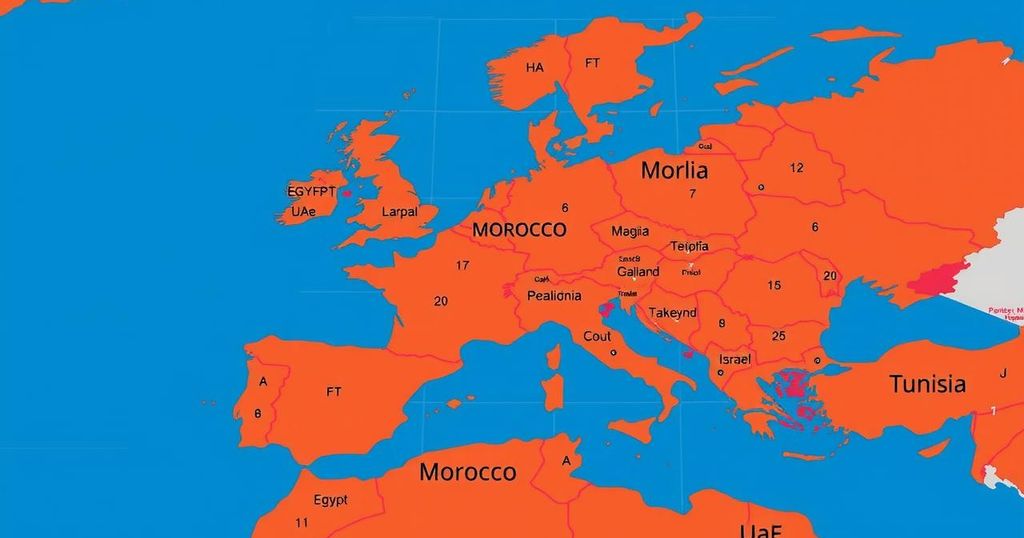UK Issues Travel Advisories for Morocco, Egypt, UAE, Tunisia, and Israel

The UK FCDO has updated travel advisories for Morocco, Egypt, UAE, Tunisia, and Israel, urging British tourists to exercise caution due to heightened regional tensions and recent military actions. Travelers are advised to remain vigilant, avoid large gatherings, and keep informed about local events while securing comprehensive travel insurance.
On November 13, 2024, the United Kingdom’s Foreign, Commonwealth & Development Office (FCDO) released updated travel advisories for British tourists intending to visit Morocco, Egypt, the United Arab Emirates (UAE), Tunisia, and Israel. These advisories were prompted by escalating military activities and rising tensions within the Middle East, particularly following Israel’s recent military operations in Iran and the ongoing turmoil across the region. British nationals are advised to exercise heightened caution and to remain informed about local developments during their travels in these countries. The FCDO’s advisories emphasize careful planning and vigilance for travelers to the affected countries. Tourists are encouraged to monitor current events, avoid large gatherings, and adhere to any directives from local authorities. The FCDO highlights the necessity of securing comprehensive travel insurance, which can mitigate potential disruptions caused by civil unrest or other unforeseen incidents. Among the nations cited, Morocco has been deemed to warrant heightened caution. The FCDO notes that tourists should refrain from participating in political gatherings, as protests might arise in response to the evolving regional context. Although Morocco is perceived as generally safe for visitors, travelers are advised to remain alert, particularly in crowded areas or near any demonstrations. The government has increased security presence in major cities and tourist destinations to enhance visitor safety. Egypt is facing similar security measures, particularly in specific locales. While noted tourist spots such as Sharm El Sheikh and Hurghada are considered relatively secure, other regions in the country pose significant risks. The FCDO advises against all travel to North Sinai due to military operations and the heightened risk of terrorism. Furthermore, tourists are cautioned to steer clear of large gatherings in urban centers, as political tensions in these areas could lead to disturbances. The United Arab Emirates, recognized as one of the Middle East’s prime destinations for British tourists, has also seen an increase in security awareness due to its proximity to conflict zones. Although the UAE has not been directly affected by recent military actions, travelers are urged to exercise caution, especially in popular areas such as Dubai and Abu Dhabi, where gatherings may lead to security concerns. In Tunisia, updated advisories cite increased security threats in certain locations, with tourists advised to avoid areas experiencing military activity or high terrorism risks, such as the Chaambi Mountains National Park. Enhanced security measures have been established at popular tourist sites, but visitors are still encouraged to remain conscious of their surroundings and follow guidance from local authorities to ensure their safety. Israel, currently facing significant security challenges, has received warnings necessitating “extreme caution” for prospective visitors. The FCDO emphasizes avoidance of non-essential travel near conflict zones, including the Gaza Strip, West Bank, and specific areas in Jerusalem. Travelers are strongly advised to stay informed and to heed any instructions from Israeli security forces given the potential for sudden military escalations. These updated advisories underscore the critical need for British travelers to approach their plans to visit Morocco, Egypt, the UAE, Tunisia, and Israel with diligence and preparation. Additional precautions include registering with local British embassies for potential assistance and ensuring travel insurance encompasses coverage for incidents arising from civil disturbances. In conclusion, the FCDO’s latest travel advisories highlight the paramount importance of safety and awareness for British tourists visiting these countries. Travelers are encouraged to remain informed, avoid hazardous areas, and adhere to local recommendations to safeguard their well-being while navigating the complexities of the current regional situation.
The United Kingdom’s Foreign, Commonwealth & Development Office (FCDO) routinely updates travel advisories to inform citizens about potential risks associated with international travel. In light of escalating tensions in the Middle East, particularly influenced by military actions, these advisories are critical for ensuring the safety and preparedness of British travelers. By highlighting regions of concern and encouraging measures such as vigilance, insurance, and compliance with local laws, the FCDO aims to mitigate risks for tourists in potentially volatile areas.
The FCDO’s updated travel warnings emphasize the importance of preparedness and vigilance for British travelers to Morocco, Egypt, UAE, Tunisia, and Israel. By staying informed about local conditions, avoiding risky locations, and adhering to guidance from officials, tourists can enhance their safety while navigating these regions. Given the ongoing security challenges in the Middle East and North Africa, it is crucial for visitors to prioritize their personal safety and make informed decisions regarding their travel plans.
Original Source: www.travelandtourworld.com








